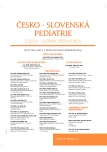-
Medical journals
- Career
Repeated spontaneous remission of atypical hemolytic-uremic syndrome caused by influenza – a case report
Authors: H. Flögelová 1; J. Volejníková 1; I. Hrachovinová 2; Z. Prohászka 3; M. Šeda 1; J. Gumulec 4
Authors‘ workplace: Dětská klinika LF Univerzity Palackého a Fakultní nemocnice Olomouc, Česká republika 1; Ústav hematologie a krevní transfuze Praha (ÚHKT), Česká republika 2; Research Laboratory, Semmelweis University, 3rd Department of Internal Medicine, Budapest, Hungary 3; Klinika hematoonkologie, Fakultní nemocnice Ostrava, Česká republika 4
Published in: Čes-slov Pediat 2020; 75 (2): 98-102.
Category: Case Report
Overview
Here we report spontaneous recovery of 2 episodes of atypical hemolytic-uremic syndrome (aHUS) in a 17-year-old male. In both cases, the condition was caused by seasonal influenza (first, influenza A/H3; second, after 1 year, influenza B). Already at the first onset of aHUS, decreased expression of CD46 (membrane cofactor protein, MCP) on granulocytes was found, suggesting the diagnosis of complement-mediated HUS. Because the patient’s clinical condition was stable and laboratory results were improving since day 3, we decided not to administer eculizumab, a drug whose administration is recommended within the first 48 hours in children, but to continue symptomatic therapy only. However, eculizumab was available in case that the patient’s clinical condition deteriorated. Spontaneous remission of HUS was achieved in both episodes of aHUS. Considering the presumed risk of aHUS relapse, genetic examinations were done following the first episode. The patient was confirmed to carry a mutation in MCP (CD46) gene (heterozygote for the p.C35Y mutation) and also a high-risk MCPggaac haplotype of the same gene. We assume that both mentioned genetic lesions played a pathogenic role in the development of complement-mediated aHUS, with influenza being the triggering condition. Molecular genetic tests were also performed in the patient’s parents and found accordingly, that the father is a heterozygote for the p.C35Y mutation and the mother is heterozygous for the high-risk MCPggaac haplotype of the MCP (CD46) gene.
We confirmed that in an individual with a mutation in MCP, seasonal influenza may be a trigger of aHUS and spontaneous remission is possible.
Keywords:
remission – influenza – atypical hemolytic-uremic syndrome (HUS) – membrane cofactor protein (MCP)
Sources
1. Seeman T, Podracká L, Štolbová Š, et al. Trombotické mikroangiopatie – hemolyticko-uremické syndromy a trombotická trombocytopenická purpura. Čes-slov Pediat 2017; 72 (2): 99–108.
2. Ryšavá R. Atypický hemolyticko-uremický syndrom a nové možnosti léčby. Interní Med 2014; 16 (1): 22–25.
3. Noris M, Remuzzi G. Atypical hemolytic-uremic syndrome. N Engl J Med 2009; 361 (17): 1676–1687.
4. Schmidtko J, Peine S, El-Housseinin Y, et al. Treatment of atypical hemolytic uremic syndrome and thrombotic microangiopathies: a focus on eculizumab. Am J Kidney Dis 2013 Feb; 61 (2): 289–299.
5. Loirat Ch, Fakhouri F, Ariceta G, et al. An international consensus approach to the management of atypical hemolytic uremic syndrome in children. Pediatr Nephrol 2016 Jan; 31 (1): 15–39.
6. Fremeaux BV, Fakhouri F, Garnier A, et al. Genetics and outcome of atypical hemolytic uremic syndrome: A nationwide French series comparing children and adults. Clin J Am Soc Nephrol 2013; 8 : 554–562.
7. Liszewski MK, Atkinson JP. Complement regulator CD46: genetic variants and disease associations. Hum Genomics 2015 Jun 10; 9 : 7.
8. Provaznikova D, Rittich S, Malina M, et al. Manifestation of atypical hemolytic uremic syndrome caused by novel mutations in MCP. Pediatr Nephrol 2012 Jan; 27 (1): 73–81.
9. Bitzan M, Zieg J. Influenza associated thrombotic microangiopathies. Pediatr Nephrol 2018 Nov; 33 (11): 2009–2025.
10. Kobbe R, Schild R, Christner M, et al. Case report-atypical hemolytic uremic syndrome triggered by influenza B. BMC Nephrology 2017 Mar 20; 18 (1): 96.
Labels
Neonatology Paediatrics General practitioner for children and adolescents
Article was published inCzech-Slovak Pediatrics

2020 Issue 2-
All articles in this issue
- Editorial: Když si děti hrají, někdy z toho problém mají
- Foreign bodies in the swallowing pathways in children
- Solid exogenous foreign bodies in the lower airways in children
- Aspiration of the foreign bodies in children – case reports
- Toy – the safe subject on the children‘s departments?
- Family Eating and Activity Habits Questionnaire – reliability verification
- Treatment of thrombosis in newborns and infants
- Determination of succinylacetone levels in a part of healthy child population in Slovakia
- Repeated spontaneous remission of atypical hemolytic-uremic syndrome caused by influenza – a case report
- Hyponatremia – serious complication of nephrotic syndrome
- Successful ultrasound-guided percutaneous ethanol injection therapy of thyroid cysts in adolescents
- Moje úsmevné spomienky na Olomouc
- Czech-Slovak Pediatrics
- Journal archive
- Current issue
- Online only
- About the journal
Most read in this issue- Foreign bodies in the swallowing pathways in children
- Successful ultrasound-guided percutaneous ethanol injection therapy of thyroid cysts in adolescents
- Treatment of thrombosis in newborns and infants
- Aspiration of the foreign bodies in children – case reports
Login#ADS_BOTTOM_SCRIPTS#Forgotten passwordEnter the email address that you registered with. We will send you instructions on how to set a new password.
- Career

